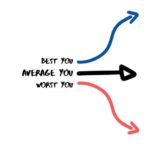Can you remember the last bad decision you made?
Nothing life altering or catastrophic, but simply a poor choice that would later lead into you feeling guilty.
Maybe you yelled at a teammate over something pointless, texted an ex late in the evening, skipped out on that last rep, or ate an entire bag of chips in one sitting. In the grand scheme of things, it wasn’t a disastrous choice. But nevertheless, why did you make it…
Perhaps you things weren’t going your way in practice and frustration was building. Maybe you were all alone and needed to talk to someone familiar. It doesn’t really matter why because at that moment it seemed like the right choice. That version of you made the best decision he was capable of making. Right?
Well, it kind of makes you wonder, was that really the best version of you or were you lacking your full mental capacity?

The thing is, this destructive habit loop can happen to all of us. It often looks something like this:
You make a choice that isn’t extremely well thought out and next thing you know you’re kicking yourself for the stupid thing you did. The regret sends you vowing to be stronger and make better decisions next time. Then, two weeks later you find yourself making the exact same or a similarly bad decision. Nothing has changed except for the fact that you now feel dumber, weaker, and more useless than before. The negative self-talk starts and you simply begin to assume that “this is just who I am, so why bother changing”.
If you are finding yourself nodding along as you just read that, then perhaps it’s time to change.
But before you head down that spiral of self-defeat, I’d encourage you to take a moment to consider that maybe there is more going on than you may realize. Take a second to ask yourself if maybe you are on the right track, but just need a little nudge in the right direction. And maybe just maybe, you might need to look for other possibilities as to why you and everyone else on the planet all make bad decisions.
H.A.L.T. BEFORE IT’S TOO LATE!
Dr. Judson Brewer is a psychiatrist who specializes in addiction and habits. Not only has he been able to help people break addiction from bad habits, but he has also shown ways to start and maintain new good habits. And of the many things he discusses, H.A.L.T. is one of them.
H.A.L.T. stands for Hungry, Angry, Lonely, Tired. And more importantly, this acronym is a warning sign for the impending possibility of making a bad decision. Our brains are wired as such, that when we enter one or more of these emotional or physical states the prefrontal cortex goes offline. And as was mentioned in a previous article, the prefrontal cortex is the part of the brain which allows us to see outside of our current environment. Among many other things, it gives us the ability to pull from the past as well as look into the future.

The prefrontal cortex is an incredibly helpful part of the brain that we are blessed to have. But when it’s hindered, like it is when we are hungry, angry, lonely, or tired, our ability to step outside of the present is drastically reduced. And as a result, we forget about the promises we made to ourselves, the mistakes we’ve made in the past, and the future selves we are aiming to become. Because our body has a strong desire to survive, when we enter a HALT state, our brain decides what matters most – not our conscious. The need to quench immediate gratification will get stronger and regret over this irrational thinking will soon follow.
HOW TO AVOID MORE BAD CHOICES
The answer to this universal problem is simple, but the actions required for success are a bit more tedious. The key element is that you have to be proactive. And how that can take shape is through these 3 steps:
1) RECOGNIZE

If you are going to attempt to limit the number of poor choices you make you must first recognize why they exist. Remembering the HALT acronym is a great start. But more importantly, you should take the time to notice when you reach these specific states. You have to be a student of your own behaviour. Whether through some sort of journal or just in your head, at the end of the day ask yourself questions such as:
- When did I get hungry and eat something I shouldn’t?
- What triggers caused me to lose my cool under pressure?
- How many hours of sleep did I get last night?
- What days was I feeling tired at practice this week?
- How well did I eat today?
2) PLAN
Once you recognize and identify the triggers that have the possibility of leading into you making a bad choice, plan ahead on how to overcome them.
PROBLEM: You always end up grabbing some greasy fast-food after your morning workout because you feel the need to eat something right away.
SOLUTION: Bring an apple and a protein shake to have right after.
PROBLEM: You find that on the days where you spend your whole morning playing videos games or binging on Netflix are also the days when you are the moody, lethargic, and more reactive at practice.
SOLUTION: Consider replacing that time with reading a book, watching an educational documentary, picking up a new hobby, or working on some other form of self-development.

By always having a plan on how to deal with each HALT state before you get out of control, you give yourself a fighting chance of making a good choice without the help of your prefrontal cortex. If you do this often enough a new habit will start to form and you will begin to crave the good feeling that comes with good decisions, as opposed to the short-lasting burst of dopamine or serotonin that comes from instant gratification.
3) NOTE
There will be days where you will screw up. You will be weak and make a bad decision. But that doesn’t mean all hope is lost. If you recognize yourself falling prey to a HALT state, take a moment to note how you feel. Once again, reflect and think about your actions. Ask some simple questions:
- Does screaming at the rookie really make you feel more superior or better about yourself? Doubt it.
- Does eating a box of cookies actually give you enough energy to compete as a high-level athlete? Nope.
- Will drinking yourself silly do anything to change the fact that you just got dumped? Definitely no.
YOUR MAP IS USELESS, UNLESS…
I’ve said this many times before, but there is no single roadmap for success. I cannot guarantee that learning about HALT will inform you on how to make better decisions in the future. At the end of the day, the choice to be a better version of yourself rest in your hands.

You can get mad at yourself all you want and regret every dumb decision you make, but without information to act on that is going to nudge you in a better direction, you’re just lost. I will leave you with a quote from Dr. Judson Brewer that I believe nicely wraps up why concepts like HALT are so important to understand.
“Rule number one is that a map is useless if we don’t know how to orient it correctly. In other words, we can use a map only if we pair it with a compass to tell us where north is. When our map is oriented, the landmarks fall into place and begin to make sense. Only then can we navigate through the wild. Similarly, if we have been carrying around a this-isn’t-quite-right feeling of dis-ease, and we lack a compass to help us orient to where it is coming from, the disconnection can lead to quite a bit of stress. Sometimes the dis-ease and a lack of awareness of its root cause are so maddening that they lead to a quarter-life or midlife crisis.” – Dr.
-Derek





